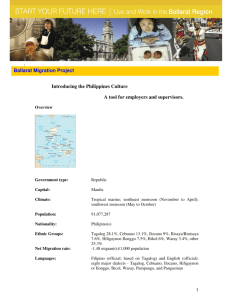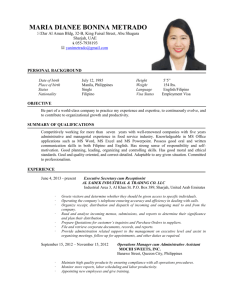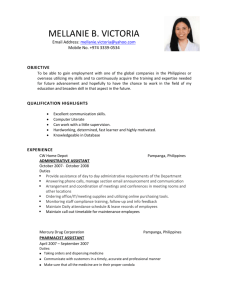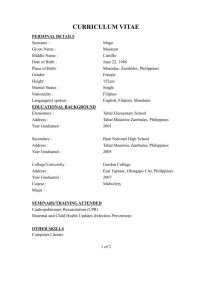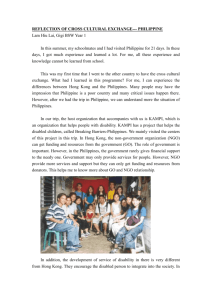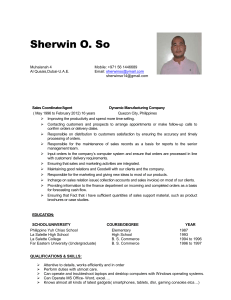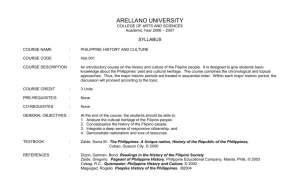Aurigui Jeffrey Aurigui English 100 BK Ms. Erpelo Essay # 3 May 1
advertisement
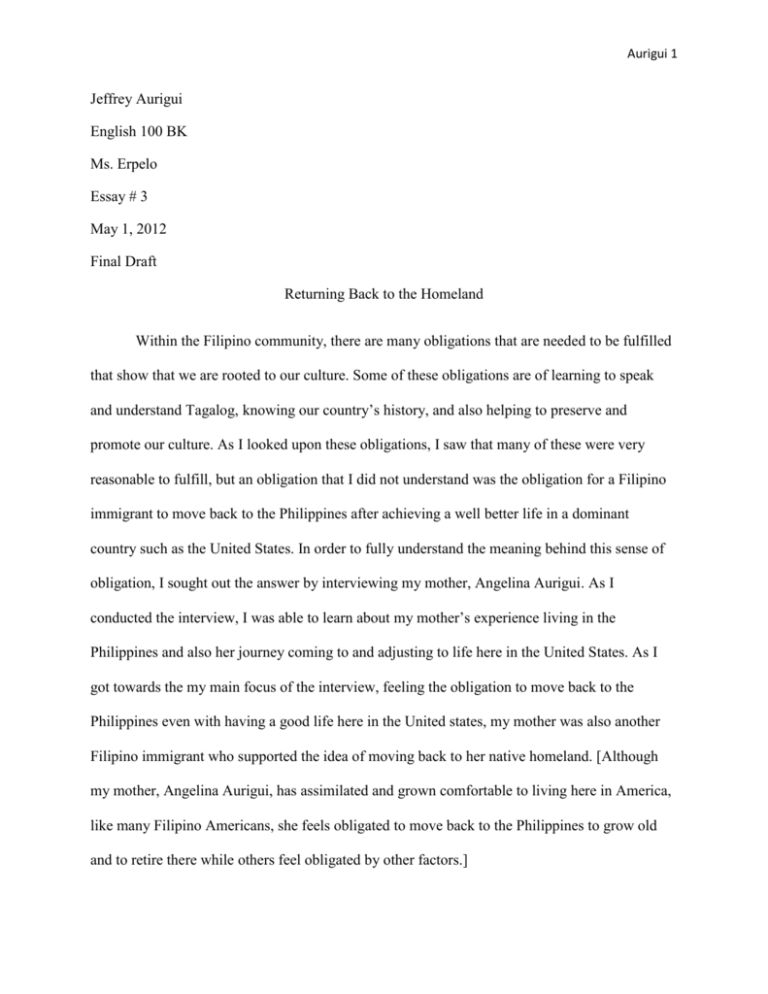
Aurigui 1 Jeffrey Aurigui English 100 BK Ms. Erpelo Essay # 3 May 1, 2012 Final Draft Returning Back to the Homeland Within the Filipino community, there are many obligations that are needed to be fulfilled that show that we are rooted to our culture. Some of these obligations are of learning to speak and understand Tagalog, knowing our country’s history, and also helping to preserve and promote our culture. As I looked upon these obligations, I saw that many of these were very reasonable to fulfill, but an obligation that I did not understand was the obligation for a Filipino immigrant to move back to the Philippines after achieving a well better life in a dominant country such as the United States. In order to fully understand the meaning behind this sense of obligation, I sought out the answer by interviewing my mother, Angelina Aurigui. As I conducted the interview, I was able to learn about my mother’s experience living in the Philippines and also her journey coming to and adjusting to life here in the United States. As I got towards the my main focus of the interview, feeling the obligation to move back to the Philippines even with having a good life here in the United states, my mother was also another Filipino immigrant who supported the idea of moving back to her native homeland. [Although my mother, Angelina Aurigui, has assimilated and grown comfortable to living here in America, like many Filipino Americans, she feels obligated to move back to the Philippines to grow old and to retire there while others feel obligated by other factors.] Aurigui 2 With having the feel to be obligated to return back to the Philippines, for most Filipino immigrants, they have many factors that contribute to this feeling of returning home. Like many Filipino Americans leaving the Philippines in search for a better life in the United States, many feel obligated to go back when they retire. Even if they are better well off living here in the United States they would rather return home in order have life more easier with the currency change from American dollars to pesos would make them more wealthier in the Philippines. In the book “Pinoy Capital: the Filipino Nation in Daly City” by Benito M. Vergara, Jr., Vergara’s interviewee, Kiko Novero, states that his parents had moved to the United States and had lived here for many years but now at the age of their sixties feel that in the next two years when they retire they should moved back to the Philippines (165). Novero also says that in the meantime, while his parents wait for the day of their retirement, they are working extra hard in order to save more money, because they are not qualified to get a bigger retirement check, so they will be able to add that to their retirement fund. Just as Vergara’s interviewee stated their parent’s factor to return home, my interviewee stated their opinion on returning home for retirement. During my interview with my mother, Angelina Aurigui, I asked her the question of if she felt obligated to return back to her homeland one day. Her response to my question was that she felt she would be able to return when she sees that her children are well off on their own and have their own families and also when she is eligible for retirement where she can use her money to put her in a status in the Philippines where she can be more financially stable. From seeing bother observations from both Vergara’s interview and mines with my mother, the idea of returning back to the Philippines for retirement both share the factors for being more wealthier with the change of currency. The trend of returning back as a richer person inflicts the image of the laid back, high maintenance lifestyle Aurigui 3 that they portrayed in their expectations of America, a reality to own self living back in their native homeland. Another factor that leads to the idea of the need to return back to the Philippines is the feel of coming back as one of their country’s hero. Many of these Filipino immigrants who migrate to the United States choose to leave because they feel they have a better chance achieving a better lifestyle for them and their family and also other objectives in their pursuit to happiness. These reasonings to migrate to the United States are seen as a sense of betrayal because these acts of reasoning are seen to the Philippine Culture as “pure personal interests”. Although some immigrants choose to move out the Philippines permanently, many of those immigrants who do move to different countries to pursue work but come back to the homeland are known as diasporas. In “Pinoy Capital: the Filipino Nation in Daly City” by Benito M. Vergara, Jr., he mentions that these returning diasporas are known to be national heroes (139). Like these diasporas, many Filipino immigrants who have achieved a better life of living here in the United States see that they need to return back in order to show that they have not betrayed their own country. The praise they get from returning back to their Philippines gives them the titles as national heroes and with the income that they bring from their work puts them in a higher status from their own people because they have contributed to help the nation’s economy which in all connects them with their roots. Within the interview I conducted with my mother, Angelina Aurigui, just like the diasporas reasoning to return to reconnect with their roots, my mother as well feels to return in her own way to also reconnect with her roots. Choosing to return back to the Philippines for the pride as being considered a hero also gives you the bridge to reconnect with your own people. Aurigui 4 In connection to reconnecting back to your own people, many Filipino immigrants choose to return back to the Philippines because of the hardships they have faced for many years reaching to achieve the better life they sought out for. Like many immigrants, the hardships that they faced ranged from discrimination, racism, exploitation, and the harsh wake up into reality from their expectation of life in a new country. In my interview, Angelina Aurigui says that one of the hardships she faced arriving and adjusting to life here in the United States was realizing that her expectations of America with living the lavish life and meeting friendly people, were not true, giving her the feeling of being homesick. In the book “On the Presence of Filipinos in the United States” by E. San Juan Jr., San Juan states that the many immigrants who moved out the Philippines were exploited in their work force and discriminated receiving long hours for low wages, being degraded as modern day slaves. These hardships caused a movement for Filipino immigrants to break away from neocolonialism and hegemony rule and to move back to the Philippines to spread this idea to liberate the country from capitalist ideals (97). Also in the article “Trajectories of the Filipino Diaspora” by E. San Juan Jr., he states that alienation in the host of a country is what unites Filipinos (236). This means that with the hardships faced in other countries, the unifications of Filipinos forms a strong bond with their ethnic pride which leads to the plans of returning home where they know they will not have to face these hardships. The feeling of being obligated to return back the Philippines accounts on many factors. After conducting my research through books, articles and interviews, these factors depend on their emotions and experiences. Some feel obligated to return in order to retire, while others may return for pride and to escape the hardships they face in another country. Although these factors contributing to returning back differ, they all share the common hold to return to reconnect with Aurigui 5 their roots. Reconnecting with our roots brings us to be able to spread the awareness of life in another country and also to help preserve our culture. Aurigui 6 Works Cited San, Juan E. On the Presence of Filipinos in the United States. Salinas, CA: SRMNK, 2007. Print San, Juan E. Trajectories of the Filipino Diaspora. Salinas, CA: SRMNK, 1997. Print Vergara, Benito M. Pinoy Capital: The Filipino Nation in Daly City. Philadelphia, PA: Templton University, 2009. Print
